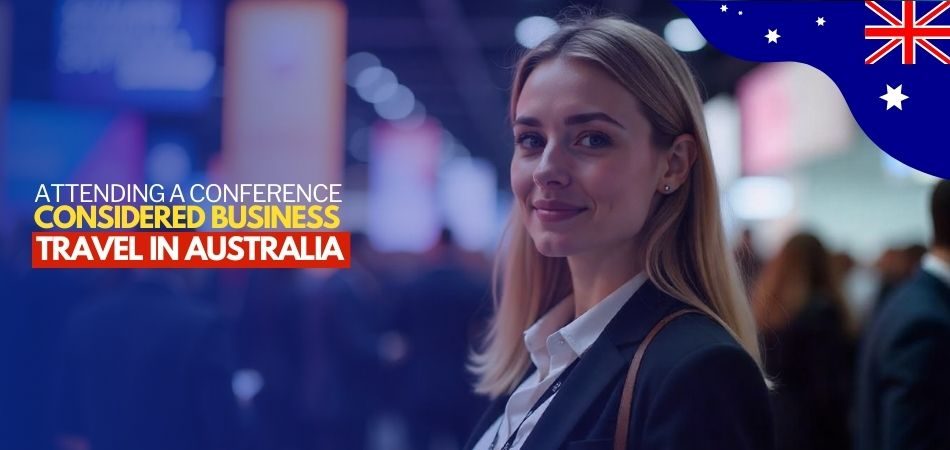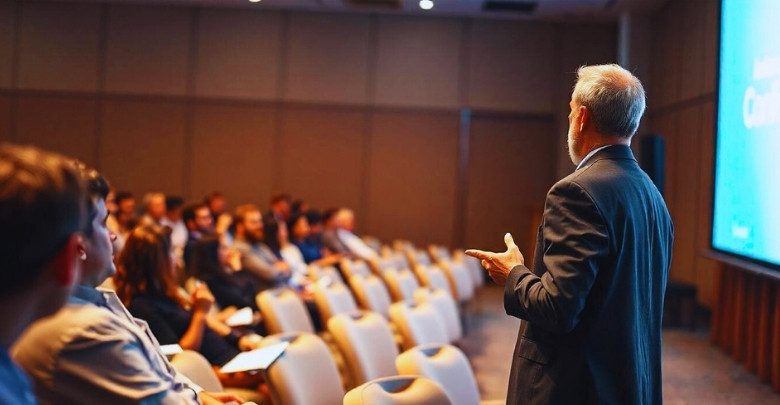Australia offers business owners and professionals a wealth of opportunities through conferences, where they can learn, network, and grow. However, a common question arises: Is attending a conference considered business travel in Australia?
Yes, attending a conference is generally considered business travel in Australia if it directly relates to work or professional development. This classification is essential, as it can make your travel expenses eligible for potential tax deductions, depending on your individual circumstances.
By following these guidelines can help you maximize the benefits of attending industry events while keeping your expenses in check. Read on to explore what qualifies as business travel, the tax implications of conference attendance, and tips on how to make the most of your conference experience in Australia.
Attending Professional Events in Australia- Why Does it Matter?
Professional events in Australia offer great value for business growth, networking, and learning. These events bring together industry experts, innovators, and professionals. By attending, you will gain insights, new skills, and connections that fuel your career development.

Moreover, Australia hosts some of the most respected industry conferences worldwide. Attending these events lets you engage with international experts, uncover global trends, and understand industry shifts. Whether local or international conferences in Australia, they provide a platform for meaningful interactions and knowledge exchange.
Furthermore, attending professional events can lead to business partnerships and opportunities. The ability to build strong connections with industry leaders can be extremely valuable for long-term career advancement. Participation in these events shows commitment to staying updated and advancing professionally.
Types of Visa for Participating in Australia
Professional events in Australia require the right visa. Different visas cover varied purposes, from conferences to business meetings. Here’s an overview of visa types for participating in Australian events:
Visitor Visa
The Visitor Visa allows short-term stays for tourism or business. It’s ideal for attending conferences, meetings, or training sessions. This visa generally covers stays up to three months in Australia. It is possible to submit applications online, but processing times vary.
Electronic Travel Authority (ETA) Visa
The ETA Visa is suitable for passport holders from specific countries. It’s often used for short business visits, including professional events. The ETA allows multiple entries over a 12-month period. Processing is generally quick, and applications can be completed online.
E-Visitor Visa
The eVisitor Visa (Subclass 651) is available for European passport holders. This visa allows business activities like conference attendance or short meetings. It grants a stay of up to three months per visit. Applications are free and usually processed within a few days.
Temporary Activity Visa
The Temporary Activity Visa covers various short-term activities, including conferences. It’s ideal for those attending longer events or specific industry programs. This visa allows stays for up to three months or more. Processing times may vary depending on the event and details provided.
Business Innovation and Investment Visa
The Subclass visa is aimed at investors and business innovators. It’s suited for high-level business events and professional engagements. This visa allows longer stays for establishing business contacts. Applications involve more detailed requirements and longer processing times.
Student Visa
The Student Visa allows students to participate in specific events. It’s intended for those in formal educational programs in Australia. Attending events related to their field is generally permitted. Students must be enrolled in a full-time study course to qualify.
Conference Visa
The Conference Visa is designed specifically for those attending conferences. However, working with a Conference Visa in Australia allows you to engage in business and academic events. This visa covers short-term stays and supports networking and knowledge sharing. Requirements are straightforward, making it accessible for international attendees.
Is Attending a Conference Considered Business Travel in Australia?
Yes, attending a conference is generally considered business travel in Australia if it’s work-related. Business travel covers trips directly tied to your professional responsibilities or growth. Conferences, seminars, and industry events all typically fall under this category for tax purposes.
For a conference trip to qualify as business travel, it must directly support your job or business. Attending events that improve your skills or expand your network can be essential. The Australian Tax Office outlines specific guidelines to help you understand these requirements.
Classifying conference attendance as business travel allows for potential tax benefits. Travel expenses, meals, and accommodation costs may be eligible for deductions. However, eligibility often depends on maintaining clear records and proving the trip’s professional relevance.
Understanding the rules around business travel helps you maximize these financial benefits. Reviewing tax policies can ensure your conference expenses qualify under business travel regulations. These guidelines help professionals make informed decisions about attending events in Australia.
What Are the Benefits of Attending Conferences?
It is beneficial to attend conferences to gain knowledge, network, and grow as a person. These events bring professionals together, encouraging industry knowledge and collaboration. Below are some key benefits of participating in conferences and how they support your career development:
Networking with Industry Professionals
Conferences are perfect for meeting people from your industry and building connections. Networking helps you establish valuable professional relationships and exchange ideas. These connections can open doors to new opportunities or collaborations. Engaging with peers strengthens your network, benefiting your career in the long term.
Gaining Fresh Insights and Knowledge
Conferences feature expert speakers who share the latest trends, research, and industry practices. This exposure helps you stay informed and up-to-date in your field. Learning from experienced professionals provides insights that may not be easily found elsewhere. These takeaways can drive innovation and growth in your work.
Developing Professional Skills
Workshops and sessions at conferences offer hands-on learning experiences. They provide a practical way to improve both technical and soft skills. Engaging in these activities builds confidence and deepens your expertise. Enhanced skills make you a more valuable asset in your profession.
Exploring Career Development Opportunities
Conferences often include sessions focused on career paths and professional growth. Attending these helps you understand potential directions for your career. They offer advice from mentors and industry leaders on advancing your professional journey. Exploring these opportunities can inspire new career goals.
Boosting Personal Motivation and Confidence
Being part of a large, motivated community encourages personal and professional growth. Conferences remind you of your industry’s larger purpose and inspire passion. Listening to successful professionals can boost your confidence and motivation. This energy can rejuvenate your approach to work and future goals.
How to Attend a Conference in Australia?
An Australian conference can be a valuable experience for both personal and professional development. To ensure a smooth journey, proper planning and preparation are essential. Here is a step-by-step procedure to help you get started:
Step 1: Research Upcoming Conferences
Begin by exploring conferences related to your field or industry in Australia. Look for events that align with your career goals and interests. Check conference dates, themes, and topics to confirm their relevance. Once you’ve chosen, note any specific requirements for international attendees.
Step 2: Register for the Conference
Once you have selected a conference, proceed with the registration process. Early registration can sometimes offer discounts and secure your spot. Read the requirements carefully to ensure you meet all criteria. Registration also confirms your commitment to attend the event.
Step 3: Obtain an Official Invitation Letter
Request an official invitation letter from the conference organizer to support your visa application. This letter acts as proof of your intent to attend the event. An invitation letter can expedite the visa approval process significantly. Keep this document safe as it is essential for applying.
Step 4: Arrange Necessary Travel Documents
Organize your travel documents, including your passport and any required visas, well in advance. When applying for an International Conference in Australia, you may need a specific visa category. Check with the Australian embassy for document requirements to ensure compliance. Proper documentation helps avoid unexpected delays during travel
Step 5: Plan Your Accommodations and Budget
Select accommodations close to the conference venue for convenience. Plan a realistic budget that includes travel, lodging, meals, and transportation. Booking early can help secure better rates and availability. Preparing a budget allows you to manage expenses effectively.
Step 6: Confirm Final Details and Itinerary
Double-check all travel arrangements, including flights, accommodations, and conference schedules. Ensure you have a copy of the invitation letter and itinerary on hand. Familiarize yourself with local transport options for ease of travel. Being organized ensures a stress-free conference experience in Australia.
Tips for Making the Most of Conference Travel in Australia
It is a great opportunity to expand your professional network and gain insight into the industry by attending a conference in Australia. To make the most of your experience, planning and engaging actively are essential. Here are some practical tips to help you maximize your conference travel:
- Plan Ahead and Set Clear Goals: Establish specific goals you hope to achieve at the conference. Clear objectives help you focus on valuable sessions and networking opportunities.
- Research the Speakers and Attendees: Look up the speakers and key attendees to identify potential networking connections. Knowing who will be there helps you prepare meaningful questions.
- Pack Smartly and Keep Essentials Handy: Bring all necessary documents, business cards, and electronics for the conference. Packing smartly ensures you are organized and ready for each day.
- Engage Actively in Sessions and Workshops: Participate fully in sessions by taking notes and asking questions. Active involvement enriches your learning experience and builds valuable insights.
- Network During Breaks and Social Events: Use breaks and networking events to connect with fellow attendees. Conversations outside sessions can lead to meaningful connections and future collaborations.
- Explore Local Attractions and Culture: Take some time to explore Australia’s unique attractions and culture. Combining work with leisure adds a refreshing experience to your trip.
- Stay Organized and Track Key Takeaways: Organize notes and materials daily to retain valuable insights from sessions. Reviewing key takeaways helps reinforce learning and plan follow-ups.
- Follow Up with New Contacts After the Conference: Reach out to people you met to solidify connections and express appreciation. Following up shows professionalism and keeps you on their radar.
FAQs About Is Attending a Conference Considered Business Travel in Australia?
The process of attending an Australian conference can raise a number of questions about eligibility, benefits, and practical considerations. This FAQ section aims to clarify common concerns about considering conference attendance as business travel in Australia. Below are some frequently asked questions and their answers.
What Are the Tax Implications of Attending a Conference in Australia?
If attending a conference is directly related to your work, expenses may be tax-deductible. Deductible items can include travel, lodging, and meals, but you should keep detailed records and consult tax guidelines to confirm eligibility.
Are Meals During a Conference Tax-Deductible in Australia?
Meals directly tied to conference events may be deductible if classified as business expenses. However, the rules may vary based on whether they are for networking or purely personal, so consult tax guidelines for clarity.
What Records Should I Keep for Conference Expenses?
Keep receipts for travel, accommodation, registration fees, and meals directly related to the conference. These records help substantiate your claim if audited and make it easier to track deductible expenses accurately.
What Is the Best Time to Register for a Conference?
Registering early is ideal as it often provides discounted rates and ensures availability. Many conferences offer early bird discounts, which can help save on registration fees while confirming your spot well in advance.
Can I Claim Transportation Costs Within Australia for Conference Travel?
Transportation costs within Australia, such as public transit or rental cars for business purposes, are typically deductible. However, personal travel outside of business hours or leisure trips may not qualify as business expenses.
Bottom Line
Conferences in Australia offer a significant opportunity for professionals to grow, network, and advance in their careers. The question, “Is attending a conference Considered Business Travel in Australia?” is addressed affirmatively when the event directly supports one’s work or professional development. This classification is beneficial, allowing attendees to potentially access tax deductions for travel expenses, accommodations, and other costs.
Additionally, knowing visa requirements and choosing the right visa type ensures a smooth entry and stay. By following the outlined steps and tips, professionals can maximize their experience, from planning and budgeting to actively engaging in sessions and networking. Aside from providing valuable insights and connections that support career growth, Australian conferences are valuable for personal and professional development.







